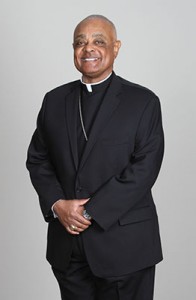Archbishop invites all to help build pastoral plan
By ANDREW NELSON, Staff Writer | Published February 20, 2014
ATLANTA—How often do you pray? When did you last go on a retreat? How welcoming is your parish to non-Catholics?
Those are questions that leaders in the Archdiocese of Atlanta will ask the 1 million Catholics in north and middle Georgia over the next few weeks. People will get a chance to tell church leaders how they feel about their parishes and issues that affect their faith life.
The polling, which the archdiocese will start March 6, launches a pastoral planning process that will wrap up with recommendations to Archbishop Wilton D. Gregory. These will serve as guidelines to shape the direction of the archdiocese for the next five years.
In part, the process will gauge the views of Catholics—including Catholics who have left the church and non-Catholics who are interested in the church—in order to shape parish life.
Archbishop Gregory, in an email interview, said that the goal is practical: to identify needs and then to dedicate resources in those areas. But it also can be unifying, he said.
The archdiocese is undergoing rapid development, which makes it important to focus resources on those areas that “will assist and direct that growth in the most practical and positive ways,” he said.
The survey and future efforts are open to all: Catholics, lapsed Catholics, and people on their way to joining the church.
“It’s very important to know what draws people closer to the church as well as those things that separate them from our Catholic community. If we discover why some people stop practicing their faith, perhaps we can react in ways that will draw them back—and avoid losing others who might choose to set aside the faith of their youth,” Archbishop Gregory said.
The effort’s success, said the archbishop, will not simply be measured in any new programs but in the impact the church has on people’s faith lives.
“If we draw people back to the embrace of our church, if we stem the loss of more fine men and women from the practice of our faith, if we reenergize those faithful Catholics with a sense of the wonder, joy, and the enthusiasm of our church, it will be a tremendous success,” he said.
The initial survey will be live online between March 6-23 in six languages.
It looks at how the nearly 100 parishes and missions of the archdiocese are serving Catholics’ spiritual needs, how well believers know the faith, and how it is lived.
In an archdiocese covering 69 counties, nearly half of the Catholic population is Hispanic. The English survey will be translated into Spanish, Vietnamese, French, Korean and Portuguese. It should take about 15 minutes to complete a survey.
Terry Ginther, executive director of pastoral planning for the Trenton, N.J., Diocese, chairs a national organization, the Conference for Pastoral Planning and Council Development, which helps dioceses working on these efforts.
She said a pastoral plan should serve as “a vision document” for a diocese, setting its priorities for the years ahead. The plan usually includes initiatives that will address these priorities and accomplish stated goals, she said.
A pastoral plan isn’t required, but it’s considered a “best practice” for church leaders, she said.
“Since a pastoral planning process is rooted in prayer, the plan is a sort of roadmap for getting from where and what we are now, to where and what we hear the Lord calling us to be,” she said.
Thousands of local Catholics recently gave their opinions on a Vatican survey of family life, a response which leaders see as encouraging. Some 4,500 people in the archdiocese participated in the survey by the Vatican that was posted on the archdiocesan website.
The two surveys are unrelated, but Peter Faletti, director of archdiocesan planning and research, said the large response shows Catholics want to share their thoughts.
The new survey will be shorter, with fewer questions, and it asks about very concrete issues, he said.
It’s not the first time the archdiocese has surveyed the Catholic community. In 2007, there was both a telephone survey and an Internet-based poll during the first phase of a strategic planning process. It examined administrative practices, demographics, and how the central ministry offices could serve the parishes. This is more faith-focused.
Deacon Dennis Dorner, chancellor, said the initiative came about following the 2012 visit to the Vatican by Archbishop Gregory, where he gave the “ad limina” report on the Archdiocese of Atlanta, a status report each head of a diocese provides every five years. Vatican officials asked how the archdiocese addressed certain topics “in light of our pastoral plan,” Deacon Dorner said.
After the visit, Archbishop Gregory chose to pursue this process of developing a pastoral plan, the deacon said.
When the survey is done, parishes will hold listening sessions during the summer to identity three recommendations on each issue that is identified as key.
Parish leaders will then meet in the fall with other nearby parish leaders to gather all their recommendations and narrow them down to three per issue.
In September, a gathering of all the priests of the archdiocese will also consider all the parish-level recommendations and narrow them to three an issue.
At the end, these two lists of proposals from the priests and the wider Catholic community will be considered by Archbishop Gregory and will be the focus of attention as he sets the course for the next five years.
